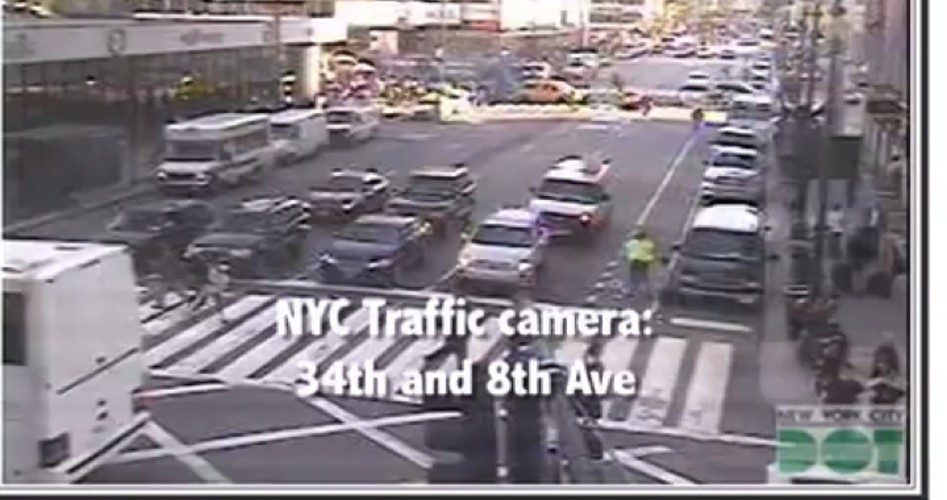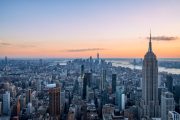
If you walk down the street in New York City or travel its subways, rest assured you’re being watched. This is unavoidable with the Big Apple’s untold thousands of security cameras, more than 17,000 of which are available for police scrutiny. Yet this is nothing. London’s notorious “Ring of Steel” comprises one camera for every 16 people, approximately half a million peering electronic eyes altogether. And while this may not seem a concern to many Americans, note that there are those who want to use London “as a model” for N.Y.C. — and perhaps beyond.
Even in Britain, though, some are sounding the alarm over the continual state surveillance, which extends far beyond the capitol. As the Times of London recently wrote:
Britain’s surveillance camera watchdog has raised concerns over the scope of a police database holding details of billions of road journeys that was set up without parliamentary authority.
Millions of car numberplates are logged daily by a network of cameras on motorways, main roads and in town centres. They are stored by police on a database that now holds 22 billion “reads” of vehicles’ front and back numberplates. The automatic numberplate recognition (ANPR) database is believed to be the biggest in the world.
And it shows. Critics warn that it’s virtually impossible for British motorists to avoid having their movements tracked. Yet even this pales in comparison to other technology already available — technology that has already been used in America.
Welcome to Persistent Surveillance Systems, a company name that’s also a characterization. As the Washington Post wrote last year, “As Americans have grown increasingly comfortable with traditional surveillance cameras, a new, far more powerful generation is being quietly deployed that can track every vehicle and person across an area the size of a small city, for several hours at a time. Although these cameras can’t read license plates or see faces, they provide such a wealth of data that police, businesses and even private individuals can use them to help identify people and track their movements.” And what is the practical application? As the Post also wrote:
Shooter and victim were just a pair of pixels, dark specks on a gray streetscape. Hair color, bullet wounds, even the weapon were not visible in the series of pictures taken from an airplane flying two miles above.
But what the images revealed — to a degree impossible just a few years ago — was location, mapped over time. Second by second, they showed a gang assembling, blocking off access points, sending the shooter to meet his target and taking flight after the body hit the pavement. When the report reached police, it included a picture of the blue stucco building into which the killer ultimately retreated, at last beyond the view of the powerful camera overhead.
Bingo, killer captured. The above occurred in Ciudad Juárez, Mexico, but this ultimate eye in the sky has also been used at an Ohio political rally, “above Baltimore; Philadelphia; Compton, Calif.; and Dayton in demonstrations for police,” reports the Post.
Of course, surveillance technology has legitimate applications. Police body cameras are showing that most racial-abuse accusations leveled against officers are bunk; they thus forestall unnecessary Ferguson-like unrest. And business owners know that surveillance can be a deterrent to crime. As with anything else, however, it can be taken too far, and the end doesn’t justify the means. For instance, a camera in every room of every residence plugged into an artificial-intelligence computer that could dispatch drones to stop “ungood” behavior would certainly secure peace — of the quiet-desperation variety.
Nonetheless, in this let-it-all-hang-out time of palatial homes long on windows and short on curtains, the clear-conscience types (and numbed-conscience types) will say, “Why should I care? I’m not doing anything wrong.” But this presupposes government will never punish you for doing what’s right. Yet this has been done, to varying degrees, by all governments throughout history. In our time, N.Y.C. has just instituted penalties of up to $250,000 for businessmen and landlords who refuse to refer to a “transgender” individual by his preferred pronoun. And in the Western world beyond the United States, people are periodically arrested for criticizing homosexuality or Islam.
Moreover, if you’d still say you have “nothing to hide,” take note: You probably do.
With more than 250,000 laws in our nation, we’re at the point Ayn Rand spoke of when saying that so many things can be declared “a crime that it becomes impossible for men to live without breaking laws.” We’re all “criminals” — it’s just a matter of determining the precise violation. Ergo complete surveillance. Yet however well this is understood, far more seldom grasped is how a surveillance state can be avoided.
British statesman Edmund Burke once observed, “Society cannot exist, unless a controlling power upon will and appetite be placed somewhere; and the less of it there is within, the more there must be without. It is ordained in the eternal constitution of things, that men of intemperate minds cannot be free. Their passions forge their fetters.” Wanting liberty (an oft-expressed desire) is not a virtue; virtue is what makes a people capable of attaining it. Wild animals and toddlers may want freedom, but neither can manage it in civilization without endangering themselves or others. So the beast is kept behind barriers and has keepers, and the toddler’s life is micromanaged by his nanny state, the parents. As the child grows, however, develops a moral compass, and becomes increasingly self-governing, dad and mom can loosen the reins. He earns his freedom.
And what applies to little people applies to peoples: “Only a virtuous people are capable of freedom. As nations become more corrupt and vicious, they have more need of masters,” wrote Ben Franklin. A nation earns liberty by exercising morality.
And as the corrupt increase in number and wickedness — as people’s internal control wanes and the external control correspondingly waxes — another inverse relationship should be understood: As punishment diminishes, surveillance will tend to increase. As I explained in 2008:
To deter bad behavior, you must ensure that the risk/reward factor militates against committing the act — that crime truly won’t pay. To accomplish this, one begins with the understanding that risk is determined by a combination of two factors:
• The actual punishment administered.
• The probability that a transgressor will be apprehended, prosecuted and convicted.
This means that as punishment becomes less severe, the apprehension rate must increase to maintain a given deterrent. And one reason we don’t thwart crime as effectively as we could is that we forget the second factor when assessing risk; we only take the punishment into consideration. This creates an economic calculus that favors the criminal.
For instance, it’s said that theft entails only a .6 percent chance of being caught and convicted; therefore, a thief has to commit an average of about 167 crimes before he will be incarcerated. Now, since the average sentence for theft is only about two months, this means a thief may serve an average of less than nine hours per robbery.
Thus, the only way a civilization insisting on slap-on-the-wrist justice can deter crime is to increase the apprehension rate precipitously. Hence the call for complete surveillance. This is important to understand because, like it or not, people will generally sacrifice liberty for security.
Of course, there is that solution to all of this: a moral citizenry. Barring this, all is for naught because technology will march on. Just as nuclear weapons in the uncivilized’s hands means eventual holocaust, Big Brother surveillance systems will be used for Big Brother aims as long as Big Brother exists. And “Little Morality“ means Big Brother.
Corrupt and vicious people have always needed masters — only now they can be mastered with technology.



